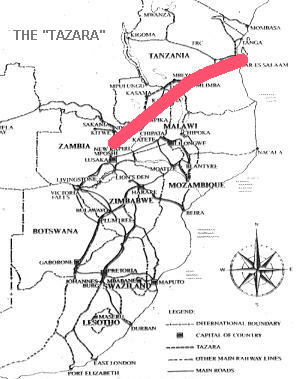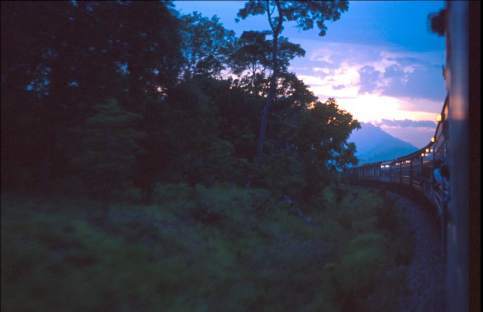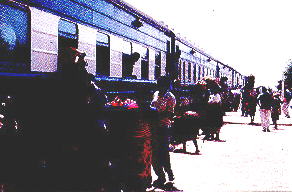
presents:
FIVE STORIES FROM TANZANIA
© 1998 RADIO BRIDGE OVERSEAS TRUST

presents:
FIVE STORIES FROM TANZANIA
© 1998 RADIO BRIDGE OVERSEAS TRUST


The first train started rolling in 1976

In what condition is this
railway line 22 years later?
Joern Remesberger is coordinating an Austrian development project:
30 million US-dollar have been made available to renovate the
rail-lines.
"I have to confirm that the Chinese did a very good
job. Despite lack of regular maintenance - repairs only when
derailments necessitated them - the line has not been in bad
shape at all, and one has to pay tribute to the quality of work
done by the Chinese."
TAZARA has become a life line for villagers along the railway. Every 20 to 30 kilometres trains stop at a station, wisely planned by the Chinese. If they hear a train approaching, and that does not happen too often according to schedule, women and children rush to the platform with baskets full of red onions, sweet potatoes, bananas, rice, tomatoes. They are living for these 10 minutes the train would stop. Such trains are always crowded with hungry passengers who are on a 3-day-journey from one end to the other, or on segments in-between. |
 |
But passenger traffic alone
cannot help TAZARA to survive. With the advent of peace in
Zimbabwe - the former Rhodesia, in Mozambique and in South Africa
other routes from Zambia to the sea are open again, cargo traffic
on TAZARA has been reduced considerably.
CLICK & READ
ABOUT TAZARA's ECONOMY
Listen
/ STORY 5 / 07'02"
"How a symbol of independence fell victim to peace"
Joern Remesberger: "As a private
person I would like to say that it would be extremely desirable,
if organisations and countries would recognize the railway
system, not only this one, in its totality, and if the work would
be finalized. Certainly, this would be an immense step into the
future of both countries, not only of Tanzania and Zambia, but of
countries around."
TOP OF THIS PAGE
![]()
MORE TANZANIA STORIES
THE RBO PRODUCTION
TEAM:
Research & Interviews in Tanzania:
Klaus Juergen Schmidt
Scripts:
Dadirayi Chigoya
& Klaus Juergen Schmidt
Presenter:
Dadirayi Chigoya
& Shorai Kariwa
Translation in
Tanzania:
From Kiswahili
& Massai: Dr. William Mchau & John Laffa
Technical Supervision
at RBO studio:
Nenad Kuzmic
Administration &
Logistics:
Dadiray Chigoya
Managing Editor &
Director:
Klaus Juergen
Schmidt
![]()